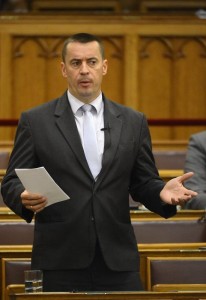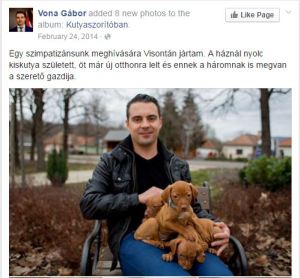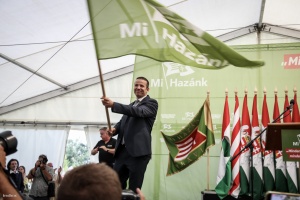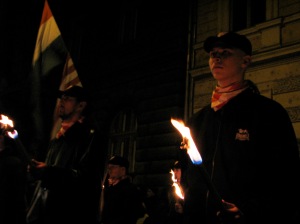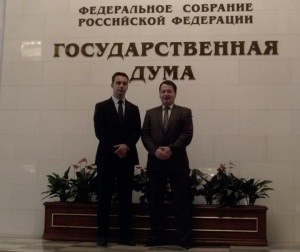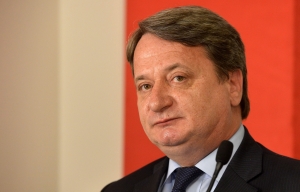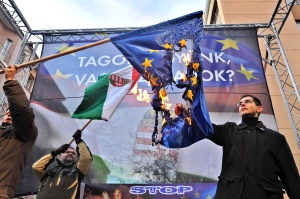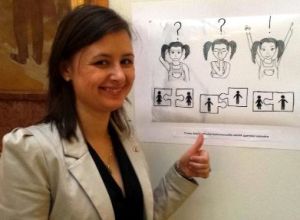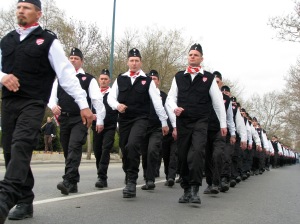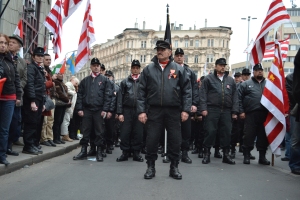Movement for a Better Hungary (Jobbik)
The Movement for a Better Hungary (Jobbik Magyarországért Mozgalom, or Jobbik) is a nationalist party that currently commands the highest number of seats among all opposition parties in Hungary’s National Assembly. Tamás Sneider has served as president of Jobbik since May 2018.
Party History
The Jobbik party formed in 2003 on the foundations of the Right-Wing Youth Community (Jobboldali Ifjúsági Közösség), an association of radical-nationalist students established at Loránd Eötvös University in Budapest four years earlier (source in Hungarian).
Jobbik defined itself at the time of its formation as a “value-centered, conservative, national-Christian party that is radical in its methods.” The party’s founding statement declared (source in Hungarian):
Both Hungarian political life and society bear the negative effects of the oppressively long 40 years [of communism] and the liberalism that swept down upon us after 1990. Whereas the communist régime was openly destructive, the current network—operating within the media-dominated multi-party system—furtively attempts to undermine natural human communities, national identity, historical Churches, local patriotism and families. The current political garniture has submitted to the forces of globalism that are placing the world under its dominion and providing immense material resources for the relaxation of traditional values and the creation of an ultra-liberal, so-called open society.
Jobbik quickly supplanted the Hungarian Justice and Life Party (Magyar Igazság és Élet Pártja, or MIÉP) as the main radical-nationalist party in Hungary.
Election Results and Parliamentary Representation
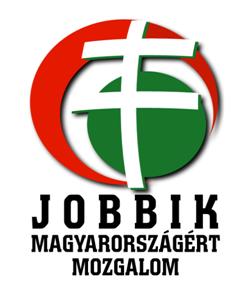 Jobbik has participated in all four National Assembly elections held in Hungary since its formation—in alliance with MIÉP in 2006 and independently in 2010, 2014 and 2018.
Jobbik has participated in all four National Assembly elections held in Hungary since its formation—in alliance with MIÉP in 2006 and independently in 2010, 2014 and 2018.
The MIÉP-Jobbik The Third Road (MIÉP-Jobbik a Harmadik Út) party alliance won just 2.2 percent of the vote in the 2006 National Assembly election, thus failing to surpass the five-percent voting threshold required for National Assembly representation. Jobbik won 16.7 percent of the vote in the 2010 National Assembly election, 20.3 percent of the vote in the 2014 National Assembly election and 19.1 percent of the vote in the 2018 National Assembly election.
Jobbik currently commands 22 of the 199 seats in the National Assembly. Jobbik is thus the strongest opposition party in Hungary’s parliament ahead of the Hungarian Socialist Party, which holds 15 seats.
The Jobbik National Assembly caucus has been part of the opposition to the Fidesz–Christian Democratic People’s Party (KDNP) governing alliance since the beginning of the 2010 parliamentary cycle.
One Member of the European Parliament (EP) is affiliated with Jobbik, while two others—Krisztina Morvai and Béla Kovács*—were elected to the EP as members of the party, though have since become independents. These currently or formerly Jobbik-affiliated representatives are part of the small faction of mostly radical-nationalist Non-Inscrits who belong to no political group within European Parliament.
*Jobbik asked Morvai to relinquish her European Parliament mandate a few days following the 2018 National Assembly election after she expressed open support for the Fidesz-KDNP governing alliance and open criticism of Jobbik during the election campaign (source in Hungarian). However, Morvai refused to surrender her mandate and immediately terminated her affiliation with Jobbik (source in English). Béla Kovács withdrew from Jobbik and became an independent in March 2018 after the Central Investigative Chief Prosecutor’s Office indicted him on charges of espionage and budgetary fraud (source A in Hungarian and B in English).
Jobbik the “People’s Party”
During the campaign for the 2014 National Assembly election, President Vona began to describe Jobbik as a “people’s party” that was capable of building a broad base of support among moderate right-wing voters in Hungary (source in Hungarian).
This signaled the beginning of Jobbik’s “people’s partyization” (néppártosodás), or deradicalization. This process initially manifested itself in a now emblematic photo that Vona posted on his Facebook page showing himself sitting with three puppies on his lap (source in Hungarian).
Vona later stated that he had initiated the transformation of Jobbik into a “people’s party” at the end of 2013, when he told Jobbik National Assembly representatives that the party needed to project “radicalism in content and not radicalism in style” (source in Hungarian).
President Vona attributed the victory of the Jobbik candidate in an April 2015 National Assembly by-election to the policy of “people’s partyization,” noting that he intended to “prune the wild offshoots [vajdhatás]” from the party (source A and B in Hungarian).
In October 2015, Vona published an editorial in the pro-Jobbik website alfahir.hu in which he wrote “I am convinced that the modern conservative people’s party that Jobbik is becoming today represents the future political center” (source in Hungarian).
2018 Party Schism
Gábor Vona resigned as president of Jobbik following the 2018 National Assembly election as a result of the failure of his deradicalization policy to significantly improve the party’s election results.
On May 12, 2018, moderate Tamás Sneider defeated radical László Toroczkai in an election to replace Vona as president of Jobbik by a vote of 298 to 256 at the party’s extraordinary congress in Budapest (source in Hungarian).
On May 22, 2018, Toroczkai, who serves as mayor of the village of Ásotthalom (southern Hungary, pop. 3,856) announced that he and six other Jobbik-affiliated mayors would form a party platform called Mi Magunk, or “We Ourselves” (source in Hungarian). Toroczkai previously founded a short-lived organization with this name, which is based on that of the Irish political party Sinn Féin, at the time of the political upheaval that began in Hungary in September 2006 (see Beginning of the End: the Demonstrators; the Leaders; the Cops; and Signs and Symbols .
Two days later, Jobbik President Sneider and National Assembly caucus Chairman Márton Gyöngyösi announced that party statutes did not permit the establishment of internal platforms and that they would therefore initiate disciplinary procedures against Toroczkai (source in Hungarian).
On May 29, 2018, Jobbik National Assembly representatives voted to expel Toroczkai supporter Dóra Dúró, the wife of the radical former party Vice-President Előd Novák, from the Jobbik parliamentary caucus (source in Hungarian).
On June 8, 2018, the Jobbik Ethics and Disciplinary Committee expelled Toroczkai from the party. National Assembly representative Dóra Dúró announced the same day that she would withdraw from Jobbik (sources A and B in Hungarian).
On June 15, 2018, Toroczkai announced that he would establish a new political party called the Mi Hazánk Mozgalom (“Our Homeland Movement”). Toroczkai said that the party would focus on problems such as foreign-currency debt, the Treaty of Trianon, immigration to Hungary and emigration from the country (sources A and B in Hungarian).
The Our Homeland Movement held its first party meeting in Ásotthalom on June 23, 2018. Self-appointed party President Toroczkai said during the meeting that “We would like a Hungary that remains a white island in Europe.” Dúró and Novák also spoke at the meeting (sources A and B in Hungarian).
On October 5, 2017, the Jobbik National Assembly representatives voted to expel party Vice-President János Volner from the Jobbik caucus following his harsh criticism of the party’s planned cooperation with the green, anti-globalist opposition party Politics Can Be Different (source in Hungarian). Jobbik National Assembly representatives Erik Fülöp and István Apáti voluntarily left the party caucus following Volner’s expulsion. Volner, Fülöp and Apáti subsequently withdrew from Jobbik (source in Hungarian).
Dóra Dúró, János Volner, Erik Fülöp and István Apáti became independent National Assembly representatives following their expulsion or withdrawal from the Jobbik caucus.
Simicska-Supported Advertising Campaign
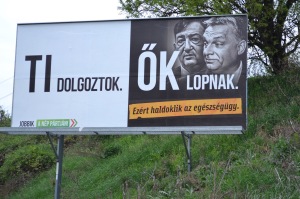
“You Work. They Steal”: Jobbik sign featuring oligarch Lőrinc Mészáros and Prime Minister Viktor Orbán (photo: Orange Files).
On April 1, 2017, Jobbik launched a major outdoor-advertising campaign featuring signs that showed the faces of Prime Minister Viktor Orbán, his chief strategic adviser Árpád Habony, Cabinet Minister Antal Rogán and Fidesz oligarch Lőrinc Mészáros above the text Ti Dolgoztok, Ők Lopnak, the English-language translation of which is “You Work. They Steal” (source in Hungarian).
On April 2, Fidesz National Assembly caucus Deputy Chairman Szilárd Németh declared during a press conference that the advertising campaign represented “ultimate evidence that Jobbik is the party of a billionaire. This naturally refers to Lajos Simicska, who manipulates Gábor Vona and all of Jobbik like a marionette” (source from 0:10).
Neither Jobbik nor Simicska denied speculation that the party was conducting its advertising campaign on billboards under the ownership of the former Orbán government oligarch’s company Mahir Cityposter.
On June 17, 2017, Jobbik announced that the party had spent 54 million forints (approximately 175,000 euros) to display the anti-government signs on 2,468 large billboards and 300 small billboards during its two-month advertising campaign. The opposition newspaper Népszava estimated that Jobbik therefore paid less than one-third of the market cost for the outdoor-advertising space on which the party displayed the signs (source in Hungarian).
State Audit Office Fine
On August 10, 2017, Hungary’s State Audit Office (ÁSZ) initiated an investigation of Jobbik’s party finances (source in Hungarian).
On December 6, 2017, the State Audit Office charged that Jobbik had accepted 331.7 million forints (1.05 million euros) in illegal non-monetary support from an unnamed legal entity— presumably Lajos Simicska—during the first half of 2017 (source in Hungarian).
According to law, Jobbik must therefore pay a fine equaling the amount of illegal non-monetary support that the party received. Moreover, the amount of money allocated to Jobbik from the government budget will be reduced by an identical sum (source in Hungarian).
On January 9, 2018, Jobbik President Vona stated that the party would not voluntarily pay the State Audit Office-imposed fine (source in Hungarian).
On March 19, 2018, Jobbik National Assembly caucus Chairman János Volner announced that the party would submit a legal challenge to the fine to the Council of Europe’s European Court of Human Rights in Strasbourg, France (source in Hungarian).
In June 2018, the Hungarian State Treasury announced that the financing of Jobbik from the government budget would be reduced as a result of the fine beginning the following month (source in Hungarian).
Jobbik and Jews
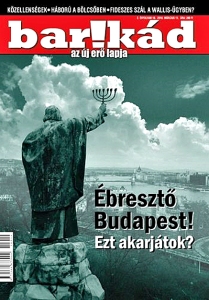
“Wake Up Budapest! Do You Want This?” Cover of pro-Jobbik weekly Barikád showing statue of Saint Gellért holding a menorah.
Jobbik officials have frequently expressed anti-Semitic prejudice and bigotry in the past.
In January 2010, Jobbik President Gábor Vona asked rhetorically during a speech, “Might that orange on their banner [the Fidesz party flag] be from Jaffa?” (source in Hungarian). Vona noted in this same speech that Jobbik had “joyfully hammered the big, arrogant noses of the SZDSZ [a largely Jewish Hungarian liberal party] into the floor” (source in Hungarian).
In April 2010, the Jobbik president said “For nearly 2,000 years, the Christian world has celebrated the savior, whom the Jews crucified, though he rose again after three days” (source in Hungarian). In May 2010, Vona declared “The Land Law has to be amended so that the Solomons cannot buy land in Hungary” (source in Hungarian).
In February 2013, Vona stated “taking current circumstances into account, if it turned out about me that I were Jewish, then I would resign from my position as Jobbik president. . . .” (source in Hungarian).
In November 2012, Jobbik National Assembly caucus Deputy Chairman Márton Gyöngyösi said during a parliamentary debate that the Orbán government should “calculate how many people of Jewish origin there are here, particularly in the Hungarian National Assembly and in the Hungarian government, who represent a certain national-security risk for Hungary” (source in Hungarian).
In May 2015, Jobbik National Assembly representative Gergely Kulcsár spit in a bronze shoe on the Shoes on the Danube Bank memorial to Jews murdered in Budapest at the time of the Arrow Cross Government (source in Hungarian). Speaking in the Hungarian Parliament Building, Kulcsár referred to the 1945–1946 Nuremberg trials as “the most disgraceful show trial in history” (source in Hungarian).
Former Jobbik Vice-President Előd Novák is widely believed to be closely associated with the virulently anti-Semitic, anonymously edited radical-nationalist website kuruc.info (source A and B in Hungarian; see also The Soul of Hungarian Radical Nationalism).

Jobbik National Assembly representative Gergely Kulcsár prepares to place flower at Shoes on the Danube Bank Holocaust memorial in Budapest.
However, after Jobbik President Vona initiated the process of deradicalization in 2014, he distanced himself and the party from manifestations of anti-Semitism.
Referring to Jobbik National Assembly representative Kulcsár’s desecration of the Shoes on the Danube Bank, Vona said “Jobbik shares in the mourning of all victims—including those of the Jews—and regards insult to this mourning to be unacceptable” (source in Hungarian); see also Interview: Jobbik President Gábor Vona). Vona then instructed Kulcsár to place flowers at the memorial (source in Hungarian).
In December 2014, the Jobbik president remarked “When I referred to the denigration of Gypsies and Jews I meant, and still mean today, that there is no need for crude and vulgar racial politics—it doesn’t lead anywhere and, moreover, it is totally foreign to me personally” (source in Hungarian).
In May 2015, Vona stated “Those who desire Nazi romanticism, those who desire pogroms have mistaken the house number, they have no place in Jobbik” (source in Hungarian).
Jobbik and Gypsies
Jobbik has focused much of its activity and policy on combating “Gypsycrime” (cigánybűnözés)—a portmanteau that the party has elevated to the mainstream Hungarian vocabulary. In 2009, Jobbik President Vona defined “Gypsycrime” (source in Hungarian):
This is a criminological term that they teach at the law university or the police academy. It doesn’t mean that every Gypsy is a criminal, but that there are special forms of crime that are characteristic of Gypsies that the police must therefore treaty specially. We [Jobbik] say that this phenomenon unfortunately exists, even proliferates in Hungary. . . . You can refer to all sorts of studies, but I think that if we hear about a knifing, usury, wood thievery, stealing precious metals, mass brawls between two families—let’s not be hypocritical—we all know that those who commit them could well be Gypsies. This is not prejudice, this is experience, this is the truth. However, there is silence about this and the historical role of Jobbik and the Hungarian Guard is that we broke through this wall of silence.
Jobbik made measures designed to curtail “Gypsycrime” the central element of the party’s political platform after Roma murdered a Hungarian schoolteacher in broad daylight in front of his two young children in the village of Olaszliszka in October 2006 (source in Hungarian).
Jobbik established the Hungarian Guard paramilitary organization in August 2007 partially—perhaps primarily—to serve as a vehicle for fighting “Gypsycrime” in rural Hungary. Since this time, the Hungarian Guard and its successor—the New Hungarian Guard—have held rallies against “Gypsycrime” in Budapest, Miskolc, Cegléd, Sarkad, Várpalota, Devecser, Gyöngyöspata, Hajdúhadház, Kunhegyes, Magyarbánhegyes, Nagykáta, Szigethalom, Tiszaroff, Vásárosnamény and other locations in Hungary.
In April 2008, Jobbik Vice-President József Tibor Bíber said during a speech (source in Hungarian):
Why do all the political forces that in are a decision-making position remain silent about the theme of Gypsycrime? Don’t they see that an ethnic bomb is ticking in Hungary? Isn’t it apparent to them that figures who are under police investigation or have already been found guilty are leading the Gypsies of Hungary? Of course it is! Only they are presumably interested in realizing what Israeli head of state Simon Peres talked about and that Hungary come under total Jewish influence. What then is Gypsycrime? Let’s not deceive ourselves: a biological weapon in the hands of Zionism.
In September 2012, Jobbik President Vona said during a party-sponsored “Cooperation for Public Safety” demonstration, referring to European Union officials who have encouraged measures to integrate Gypsies in Hungary, “Let them take 3,000 Gypsies to Brussels, integrate them, and only afterward bring them back” (source in Hungarian).
However, since he initiated the effort to transform Jobbik into a “people’s party,” Vona has adopted a more conciliatory stance toward Gypsies. In February 2015, for example, Vona ordered Jobbik Mezőtúr Municipal Council member János Kötél to move in with the party’s Gypsy Municipal Council member from the town of Hajdúszoboszló for three days after he issued threats of physical violence against Roma on his Facebook page (source A and B in Hungarian).
Jobbik and Russia
Jobbik is one of several pro-Russian nationalist political parties in Europe, which also include the British National Party, the National Front in France, the Lega Nord in Italy and the Freedom Party of Austria.
Jobbik supported Russia during the Russo-Georgian War of 2008, supported Russia’s annexation of the Crimea in 2014 and has backed the Russian secessionist movement in the Donbass region of Ukraine since the latter year (source A, B, C, D, E and F in Hungarian). Jobbik depicts the conflict in eastern Ukraine as a proxy war between Russia and the United States in which the latter is the aggressor.
High-ranking Jobbik officials Béla Kovács and Márton Gyöngyösi served as foreign observers in both the Crimean status referendum and the Donbass status referenda of 2014, declaring all three plebiscites to be valid (source A and B in Hungarian). The government of Ukraine subsequently declared Kovács and Gyöngyösi to be personae non gratae and banned them from entering the country (source A and B in Hungarian).
In May 2013, Jobbik President Gábor Vona said (source in Hungarian):
Jobbik is an anti-communist party, although we were the first ones to truly propose that Russian relations must finally be put in order. Not just at the level of diplomatic texts, but in reality as well. When the Georgian conflict was taking place and the entire Hungarian élite was talking to satisfy the Americans, we indicated that this is not at all what the issue was all about.
In January 2014, Vona stated (source in Hungarian):
My opinion has not changed. For Hungary, Euro-Atlantism has brought economic, political and cultural crisis, thus we need to reappraise our international status. For me, Eurasianism means that Hungary can serve as a kind of intermediary between Europe and Asia. I know that the roots of this concept lead to Russia, I am familiar with the writings of Trubetzkoy [Russian linguist and proponent of Eurasianism] and I have the luck to be personally acquainted with professor Dugin [Russian sociology professor, radical-nationalist political leader and proponent of Eurasianism Aleksandr Dugin]. The advantage of Eurasianism is that it preserves the autonomy of the various regions and is built on a sort of continental cooperation against the oppression of the European Union.
In June 2014, Vona declared (source in Hungarian):
In Western Europe, they call Jobbik ultra right-wing and neo-fascist, whereas in truth it is a matter of nationalists, anti-globalists and conservatives who are stepping up against the USA and the European Union and strive to build strategic relations with Russia.
In January 2015, Vona asserted (source in Hungarian):
For us, the Ukrainian situation is the one that is portentous in several regards. On the one hand, a bitter war is taking place in a neighboring country, while on the other hand the fate of a quarter million Hungarians in Ukraine has come into doubt. It is important to state first of all that this is not a civil war, not even a Ukrainian-Russian war, but an American-Russian war for which Ukraine merely serves as the stage. If this is the case, then it must be declared that neither Europe nor Hungary should assume a role in this. Europe and Hungary must develop an independent Russian policy, not simply copy down what Washington dictates to them.
President Vona has made four official trips to Russia—in December 2008, May 2013, June 2014 and November 2014.
In December 2008, Vona delivered a speech entitled “Can Europe Exist without Russia?” before members of Vladimir Putin’s United Russia party (source in Hungarian). In May 2013, Vona met with State Duma Committee on International Affairs Leonid Kalashnikov and held a lecture at Lomonosov Moscow State University during which he referred to the United States as the “deformed baby” [torzszülött] and the European Union as the “betrayer” [áruló] of Europe and declared that Russia was more European than the USA and the EU because it has preserved its traditions (source in Hungarian).
Vona held talks with Motherland-National Patriotic Union (Rodina) radical-nationalist party leader Alexei Zhuravlyov during both of his trips to Russia in 2014, declaring that Russians were being subjected to “ethnic cleansing” in eastern Ukraine during the June visit and discussing energy issues with State Duma Energy Committee Chairman Ivan Grachov during the November visit (source A and B in Hungarian).
Jobbik officials have repeatedly denied allegations that the Russia receives financial support from Russia. In March 2016, President Vona said during an interview “There is no and never has been Russia support of any kind! I would not accept any kind of foreign support” (source in Hungarian).
The Russian Connection: Béla Kovács
Jobbik adopted its pro-Russian policies under the guidance of former party Foreign Affairs Committee Chairman Béla Kovács, who also serves as a Member of the European Parliament.
Kovács was born in Hungary to a Hungarian mother and Soviet military officer father, though grew up in the custody of foster parents. Kovács graduated from the Moscow State Institute of International Relations in 1986, then returned to Hungary with his Russian wife, Svetlana Istoshina. In 1988, Kovács and his wife moved back to the Soviet Union, where he “worked at various international trade companies” until returning to Hungary permanently in 2003. Kovács joined Jobbik in 2005 and became the chairman of the party’s Foreign Affairs Committee the same year (source A, B and C in Hungarian).
Kovács organized Jobbik President Vona’s first official visit to Russia in 2008 and accompanied him on his trips to the country in May 2013 and June 2014 (source in Hungarian).
Kovács served as a substitute member of the EU-Russia Parliamentary Cooperation Committee from 2010 to 2014. At a meeting of the committee in Kaliningrad in 2013, Kovács asked a member of Russia’s Federal Assembly if “in the future it will be possible for an EU member state to initiate negotiations regarding membership in the Eurasian Union?” (source in Hungarian).
In May 2014, Chief Prosecutor Péter Polt of Hungary officially requested that the Parliament of Europe lift Kovács’s diplomatic immunity so that his office could pursue an investigation of espionage activity that the Jobbik MEP allegedly conducted on behalf of Russia against institutions of the European Union (source in Hungarian). In October 2015, MEPs voted by a show of hands to lift Kovács’s diplomatic immunity, thus permitting the Chief Prosecutor’s Office to proceed with its investigation (source in English).
Kovács, now commonly known in Hungary as KGBéla, has steadfastly denied spying for Russia, claiming shortly after the request to lift his parliamentary immunity in 2014 that “I have never been a member of either Hungarian or foreign secret services, I have never cooperated with them and never received a request [to do so]” (source in Hungarian).
Jobbik has maintained that the party will wait for the evidence surrounding the investigation to be released before making a decision regarding Kovács’s future in the party. In January 2015, Jobbik President Vona said “I have said innumerable times that if Béla Kovács is an agent, he has no place in the party. Based on information from the press and political attacks, a responsible party leader cannot make a decision of this importance” (source in Hungarian starting at 0:30). In March 2016, Vona stated “I have said from the beginning that I would like to see what the evidence is, what is the truth and if Béla Kovács is a spy, then I know what I have to do: there is no place in Jobbik for a spy” (source in English).
In September 2014, the Hungarian news website index.hu published an investigative report suggesting that Kovács’s wife, Svetlana Istoshina, had served as a KGB operative in the 1970s and 1980s, during which time she had married two other men for the purpose of obtaining foreign passports—a Japanese from whom she never obtained a legal divorce and an Austrian. Kovács insisted during an interview with index.hu that his wife has never been associated with the KGB (source in English).
In December 2017, the Central Investigative Chief Prosecutor’s Office (Központi Nyomozó Főügyészség) indicted Kovács on charges of espionage and budgetary fraud. Kovács announced following the indictment that he would withdraw from Jobbik (source in Hungarian). Kovács’s trial is scheduled to begin at the Budapest Regional Court in July 2018 (source in Hungarian).
Jobbik and the European Union
In January 2014, Jobbik President Gábor Vona said during a speech: “The European Union is nothing more than a colony-holding empire in which the richer member states regard and hold the poorer Eastern-European member states to the east (sic!) to be a base of cheap labor, a valuable market and a simple waste dump” (source A and B in Hungarian).
In February 2013, Vona published an article in the pro-Jobbik weekly Barikád in which he wrote (source in Hungarian):
Money received from the [European] Union is not what it appears to be. We have written and stated many times already that most so-called [European] Union support does not even arrive to the country because we are not capable of calling it down. And what does nevertheless reach here we can use exclusively for the objectives that the [European] Union defines for us. In vain the Brussels money, our economy has not developed an iota from it. The most striking example of this was the Miskolc Gypsy Tent [a proposed Roma Cultural Center] in which they wanted to squander 1.7 billion forints.
In January 2012, Jobbik Vice-President Előd Novák burned a European Union flag a party-sponsored anti-EU demonstration in Budapest (source in Hungarian).
Jobbik officials have repeatedly called for a referendum to be held in Hungary regarding the country’s membership in the EU (source A, B, C, D and E in Hungarian). Jobbik President Gábor Vona referred to the party’s proposed referendum on European Union membership during a March 2015 interview (see Interview: Jobbik President Gábor Vona): “The current EU is not good for Hungary. But this would not be the first question. First we would ask people about modifying the membership treaty and if renegotiation is not possible then the decision about withdrawal must be made.”
Jobbik’s party platform for the 2010 National Assembly election included the following four-point “European Union Program” (source in Hungarian): “Rejection of the Lisbon Treaty foreshadowing [the establishment of] the European United States; support of the concept of the Europe of Nations with new allies; assertion of Hungarian interests without compromise; maximum utilization of the European Union-supported regional policy with the objective of achieving economic and cultural national unification between the Hungarians of the truncated country [csonkaország] and those living beyond the borders.”
Jobbik’s party platform for the 2014 National Assembly election suggested that Hungary could leave the European Union and join Iceland, Norway and Liechtenstein in the European Free Trade Association (source in Hungarian):
If the European Union continues to travel in the direction of Brussels-based empire-building, our homeland must consider leaving this community and rethinking its system of international relations in order to ensure its own survival, assert its own interests and further its own progress. This step can naturally only be taken as the result of a referendum. We envisage the future of Hungary, similarly to that of Iceland, Norway and Switzerland (sic!), in the European Economic Area (sic!) with the transformation of our system of relations and the termination of our unilateral Euro-Atlantic dependence.
In September 2015, Vona declared “In fact what we are seeing now is the collapse of the European Union. Although it continues to function in a legal sense, in practice it has already ceased to exist and the appearance of a few hundred thousand unarmed migrants was enough for this [to happen]” (source in Hungarian).
However, Jobbik officials discontinued their open criticism of the European Union following the party’s deradicalization. In May 2017, the opposition website index.hu quoted Vona as saying that Jobbik was “absolutely committed” to the European Union and that “we support Hungary’s EU membership” (source in Hungarian).
Jobbik and the Alliance of European National Movements

Jobbik President Gábor Vona (center) presides over the foundation of the Alliance of European Nationalist Movements in 2009.
Jobbik and four other European radical-nationalist parties—the National Front (France), the National Front (Belgium), the Social Movement-Tricolor Flame (Italy) and the National Democrats (Sweden)—formed the Alliance of European National Movements (AENM) during Jobbik’s annual party congress in October 2009 (source in Hungarian).
The British National Party joined the AENM in November 2009 (source in English), while the National Front of France withdrew from the alliance by January 2012 (source in French).
And undated British National Party communiqué stated that Svoboda (Ukraine), the Republican Social Movement (Spain) and the National Renovator Party (Portugal) had joined the Alliance of European National Movements (source in English). However, in March 2014, Svoboda withdrew from the AENM because the alliance had failed to support the 2014 Ukrainian Revolution (source in English).
Jobbik is the only member of the AENM that currently has parliamentary representation at either the national or European level.
The official website of the Alliance of European National Movements does not reveal its member parties (source in English).
In December 2013, the AENM elected Jobbik MEP Béla Kovács to serve as the alliance’s president (source in Hungarian).
Jobbik and Homosexuality
Jobbik officials have proposed criminalizing public expression of homosexuality and banning gay-pride parades and other public LGBT events.
In April 10, 2012, Jobbik National Assembly representative Ádám Miróczki submitted a bill prescribing punishment of up to three years in prison for acts “popularizing in public sexual relations (perversion) with another individual of the same sex or other types of sexual behavior disorder.”
The proposed legislation called for imprisonment or a fine of up to 150,000 forints (500 euros) for “displaying in public a) perversion or b) other sexual behavioral disorder as normal sexual behavior that is not carried out with the intention of popularization” (source in Hungarian).
On the same date, Miróczki submitted a proposed amendment to Hungary’s Fundamental Law calling for the right of assembly to be denied to those who wish to “depict or popularize . . . sexual behavioral disorder—particularly sexual relations between those of the same gender” (source in Hungarian).
Neither proposal advanced through the relevant National Assembly committee.
Jobbik officials have for many years called for the banning of the annual Budapest Pride parade (source A and B in Hungarian). In May 2015, Jobbik officials, including President Gábor Vona, former Vice-President Előd Novák and Miróczki, suggested that the party would prohibit the parade if it came to power (source in Hungarian from 5:00).
On June 20, 2011, Jobbik National Assembly representative Dóra Dúró said with regard to the previous weekend’s Budapest Pride parade (source in Hungarian):
The homosexuals’ Saturday parade insulted Christianity and Democracy as well, the latter with the active participation of the police. . . . I would just quietly ask how many tens of millions, hundreds of millions of forints it costs the Hungarian taxpayers for the police to serve the anti-human, deviant homosexuals even at the price of trampling the rights of the normal majority into the mud.
However, in November 2017, Vona said during an interview with the Lajos Simicska–owned opposition newspaper Magyar Nemzet that he no longer favored prohibition of the annual Budapest Pride parade (source in Hungarian):
During the past seven years of the Orbán government we were really able learn how important civil liberties are. The freedom of assembly, for example, is one such [liberty]. Therefore, I would not want to prohibit anybody from parading . . . as long as the event does not transgress upon the sensibilities of others.
Jobbik and Capital Punishment
Jobbik advocates restoring the death penalty in Hungary despite the European Union’s prohibition of capital punishment in member states.
Jobbik’s party platform for the 2010 National Assembly election stated “We will reintroduce the possibility for the death penalty in the event of the gravest anti-life crimes, thus assuming the need to rethink relevant international agreements” (source in Hungarian).
Jobbik’s party platform for the 2014 National Assembly election stated “Following social consultation, we will call a referendum regarding restoration of the death penalty, thus assuming the responsibility to take necessary steps and the possible international conflicts resulting from this” (source in Hungarian).
In July 2012, Jobbik President Gábor Vona posted the following message on his Facebook page (source in Hungarian):
The death penalty must be restored. The question of restoring the death penalty has been part of the Jobbik program since the very beginning. . . There is currently a need for the strict Christianity of Saint László [King Ladislaus I of Hungary], at least in the area of criminal prosecution. Currently crime and the criminal enjoy such social ascendancy over innocence and the victim that the disjointed proportions must be put back in place. Tens of thousands of potential killers are loitering about on the streets.
Jobbik and the Hungarian Guard
Jobbik established the Hungarian Guard (Magyar Gárda) paramilitary organization at an initiation ceremony on Castle Hill in Budapest in August 2007. Jobbik President Gábor Vona served as the leader of the organization.
Among the stated purposes of Jobbik’s unarmed paramilitary wing were “The physical, spiritual and intellectual instruction and self-instruction of enlisted and sworn-in Guard members” and “In exceptional cases the strengthening of national self-defense” (source in Hungarian).
In practical terms, the Hungarian Guard served primarily as a vehicle for implementing Jobbik’s proclaimed campaign against “Gypsycrime,” conducting rallies in Budapest and several locations in rural Hungary to protest and deter Roma-perpetrated crime.
The Hungarian Guard had around 2,000 uniformed members following several public initiation ceremonies in Budapest and elsewhere in 2007 and 2008 (source A and B in Hungarian).
On July 2, 2009, the Budapest Court of Appeals banned the Hungarian Guard on the grounds that the organization’s rallies at various locations in Hungary had engendered the threat of violence, thus violating the right of local inhabitants to freedom and security (source in Hungarian).
Jobbik President Vona submitted a challenge to the verdict to the European Court of Human Rights, claiming that banning the Hungarian Guard had violated his freedom of assembly and association guaranteed in Article 11 of the European Convention on Human Rights. In July 2013, the European Court of Human Rights rejected Vona’s challenge, concluding that the restriction of his freedom of freedom and assembly could be regarded as pursuing the aims of public safety, the prevention of disorder and the protection of the rights of others (source in English).
Jobbik maintains no organizational ties with the New Hungarian Guard established on July 5, 2009 as the successor of the Hungarian Guard. However, Jobbik cooperated closely with the New Hungarian Guard in the organization of vigilante patrols conducted in the Gypsy-inhabited sections of the villages of Gyöngyöspata and Hajdúhadház in the spring of 2011 and at the largely Gypsy-inhabited Avas Housing Estate in the city of Miskolc in October and November of 2012 (sources A, B, C and D in Hungarian).
Vona presided over the induction of New Hungarian Guard members at an abandoned football field in Akasztó in August 2013 (see Uniform Disorder).
On July 4, 2015, Vona issued the following written salutation to a meeting of the New Hungarian Guard: “Not only in the past have I been a member, not only do I presently accept this, but in the future I will remain your brother-in-arms [bajtárs]” (source in Hungarian).
Jobbik and Turanism
Jobbik officials have advocated the theory that the Hungarians are related to present and past Altaic-speaking peoples of Asia, including the Turks, Mongols and—above all—the Huns, thus refuting the predominant Finno-Ugric principle that Hungarians are related directly only to the Finnish, the Estonians, the Sami (Laplanders) and several minor peoples in central Russia (the Khanty, the Mansi and others).
The notion of Hungarian-Altaic kinship is based on Turanism (or Pan-Turanism), a political movement that emerged in Hungary during the second half of the 1800s as a counterpoise to Pan-Slavism and Pan-Germanism emphasizing the common origin and ancestral homeland of the Finno-Ugric and Altaic peoples in the region of Turan—a Persian designation for Central Asia. The specific notion of Hun-Hungarian kinship is also rooted in the famous Hungarian legend portraying the brothers Hunor and Magor as the common ancestors of the Huns and the Hungarians.
Jobbik depicts the generally accepted Finno-Ugric classification of the Hungarian people and language as a contrivance that Habsburg officials developed at the time of the Austro-Hungarian Monarchy (1867–1918) in order to weaken Hungarian national identity and thereby ensure German domination of the dualist state (source A and B in Hungarian).
In September 2009, Jobbik published the following communiqué (source in Hungarian):
With the start of the new school year, Jobbik calls upon the leadership of the Hungarian Academy of Sciences and the members of relevant institutions, teachers at universities, colleges, high schools and elementary schools as well as others involved in Hungarian scientific life, thus authorities at the cultural ministry and those who order textbooks, to conduct the long overdue criticism and of the Finno-Ugrian theory of the origin of the Hungarians and to organize the series of debates that would be necessary for this and—at the same time—to return to its rightful place the several-thousand-year-old consciousness of origin preserved in the collective Hungarian memory, the Hunor-Magor legacy, particularly in textbooks.
In May 2010, Jobbik President Gábor Vona declared “I am not a Finno-Ugrian!” (source in Hungarian). In June 2014, Vona told a Russian on-line news portal vzgliad.ru “I am Eurasian” (source in Hungarian).
In May 2013, Vona asserted that “The Hungarians are a people of Turkish origin that became what it is on the steppes of Russia before migrating to the west in order to establish a state in the Carpathian Basin” (source in Hungarian).
The header of Vona’s personal website, which has been incorporated into his Facebook page, proclaimed “We Are the Grandchildren of Atilla (sic!)! We Are Not Afraid of Anybody!”
Jobbik and Capitalism
Jobbik espouses anti-capitalist ideology (source in Hungarian). The party’s platform for the 2014 National Assembly election stated (source in Hungarian):
The global capitalist model built upon the free movement of multi-national capital has failed. Billions of people have become both physically and spiritually destitute and the social gulf has continued to widen. The crisis was even more destructive in Hungary, because for the past quarter century the harmful activity of an anti-national and corrupt political leadership class has complemented these global processes.
In September 2009, Jobbik President Gábor Vona wrote in the pro-Jobbik weekly Barikád (source in Hungarian):
Global capitalism is finished, as are the connected (neo)liberal market-economy, the consumer society, the world domination of multi-national capital and, along with them, liberal democracy as well. . . . The economic order built on free competition—the unrestricted superiority of the strong, that is the major capitalists, has failed before our eyes, because it tore apart the deep tissue of society, but did not provide anything in its place, only the possibility for people to sacrifice themselves on the altar of multi-national capitalism.
In May 2013, Vona said during an interview with the Russian website geopolitica.ru (source in Hungarian):
It is the most correct if we say that Jobbik is a national-radical party, which is not chauvinist, which confronts global capitalism and its three primary representatives—the USA, the EU and Israel—from the pedestal of universal human values.
September 2013 Vona stated during an interview with the Voice of Russia radio station (source in Hungarian):
Global capitalism is, in fact, the United States-led economic-political world order, which is forcing its own rules—liberal democracy, free trade, multi-national capital, international banking and liberal cultural policy—on the world.
Vona on Democracy
Three quotes regarding democracy from Jobbik President Gábor Vona (source A, B and C in Hungarian):
“We are not communists, we are not fascists, we are not national socialists, though we are not democrats either” (January 28, 2012).
“We are not democrats because money and capital are not our intellectual center. We are living through the dictatorship of money and capital under the guise of democracy” (January 31, 2012).
“The smallest fundamental unit of modern democracies is not the person, but its debased torso, the mass being. . . . the stupid. For the stupid, the single objective of politics is to fill his belly and to stimulate his unfurrowed mind with subhuman television programs. . . . He is the raw material of modern democracy. . . . The stupid, the pig that wallows in the hogwash and devours everything” (August 27, 2013).
Jobbik vs. Fidesz
Although Jobbik and Fidesz are formally political adversaries, the parties espouse common national-conservative ideology. The difference between the two parties lies not in content, but in style: Jobbik is merely a more radical, outspoken and abrasive version of Fidesz. Now that Jobbik has renounced open expression of anti-Semitism and anti-Gypsyism, the parties maintain nearly identical political sympathies and aversions. Fidesz, in fact, largely carried out the Jobbik’s party platform for the 2010 National Assembly election (see Follow the Evil Twin).
Fidesz-KDNP may, therefore, be inclined to establish some type of formal or informal coalition with Jobbik or a splinter faction thereof if the alliance fails to obtain an absolute majority of seats in the National Assembly in Hungary’s 2022 general election.
Last updated: October 29, 2018.
